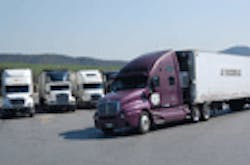A joint effort by the U.S. Financial Accounting Standards Board (FASB) and the International Accounting Standards Board (IASB) to “harmonize” global accounting standards may end up rewriting truck leasing rules to a large extent, changing the way fleets need to account for leased trucks on their ledger books.
The ongoing convergence of accounting standards between the U.S.’s generally accepted accounting principles (GAAP) and International Financial Reporting Standards (IFRS) are expected to impact $1.2 trillion in gross lease obligations, according to a survey conducted by global consulting firm PricewaterhouseCoopers (PwC), as well as change revenue recognition and financial instruments for a wide variety of businesses.
According to the 1,400 CFOs, chief accounting officers, controllers, and managing directors polled by PwC earlier this year, these proposed accounting changes will hit leasing the hardest and should also take the longest amount of time to implement.
“U.S. financial reporting will undergo an unprecedented level of change within the next several years, and companies can minimize disruption by starting now to raise organizational awareness and evaluate the impact convergence will have,” said James Kaiser, US GAAP convergence and IFRS leader for PwC. “The impact of convergence on businesses goes well beyond just accounting and reporting.”
Brad Hoffelt, senior VP-analytics with GE Capital Fleet Services, said the biggest proposed accounting standards change trucking would see is the “capitalization” of all equipment leases. That would mean so-called “operating” leases now treating monthly truck lease payments as ongoing expenses would now need to switch them to some form of depreciation and amortization.
“The big advantage to truck leasing, obviously, is that you avoid the upfront capital investment. That doesn’t change,” he told Fleet Owner. “Also, all the ‘administrative’ benefits remain in place, with the leasing company handling vehicle titling, registration, etc. What these accounting proposals do is create a ‘mechanical’ shift in how the asset is accounted for on the financial balance sheet.”
Hoffelt stressed that such changes are only proposals at this stage. The FASB/IASB accounting standard harmonization draft released earlier this year is still in the comment phase, with another draft possibly due for review in June. At the earliest, he said, the two financial accounting organizations expect to have a final proposal ready by year’s end.
Still, any such changes would at the bare minimum require companies that lease trucks to overhaul their bookkeeping practices.
PwC found that, where leasing is concerned, only 36% of respondents maintain lease information centrally while 60% of respondents account for their leases manually with spreadsheets. Given that all leases will need to be recorded on the balance sheet, that data decentralization is expected to present significant challenges in terms of data gathering, data accuracy and internal controls when adopting the new standard, said PwC’s Kaiser.
Additionally, only 10% of respondents said they have deployed resources and begun to actively plan for implementation of the convergence standards, he said. And while only 9% of respondents to PwC’s survey have calculated an estimate of their adoption date lease liability, the majority of those that have anticipate their liability will be higher than initially expected.
“But those respondents need not be overly concerned,” said Kaiser. “Currently, we’re advising clients to monitor the discussion around these standards and communicate to senior management and the board to keep them updated. Companies should also start to assess, at least at a high level, how the proposed changes will impact their company and form a point of view on the level of impact.”
About the Author
Sean Kilcarr
Editor in Chief
Sean Kilcarr is a former longtime FleetOwner senior editor who wrote for the publication from 2000 to 2018. He served as editor-in-chief from 2017 to 2018.
